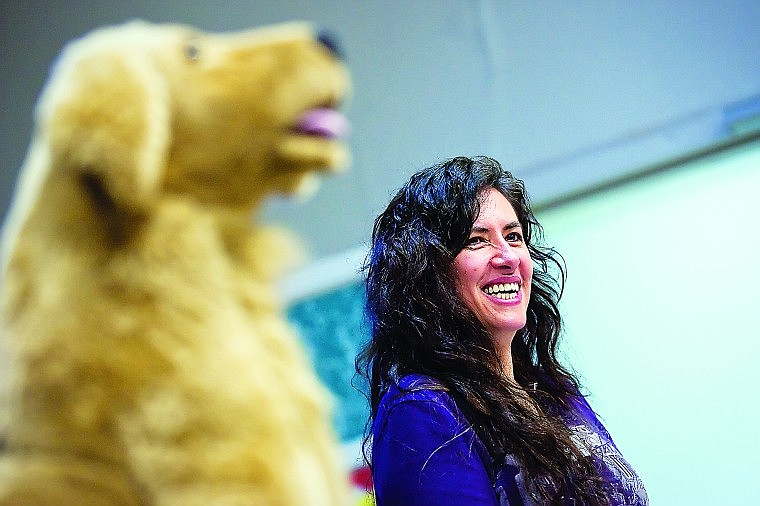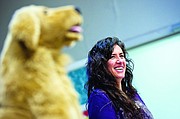When dogs are in danger
COEUR d'ALENE - Suzanne Hawk flashed a big smile as she stood before her class Tuesday and introduced herself.
"Hi everyone. We're going to have fun," she said. "These are my assistants."
Her assistants had little to say, however. They remained still and quiet. Motionless, even. Pretty good for a black Labrador and a golden retriever.
Of course, it helped their behavior that they were stuffed toys.
"We can't use real dogs," Hawk said to her five students. "Dogs don't play well together. Dogs get nervous. It's easier with our dogs."
Hawk's mild-mannered companions were there as models for her dog first aid and safety class at the Harding Center.
Pet owners can learn how to perform CPR, how to check a dog's pulse, how to treat a wound, what to do for a bee sting or a seizure or how to respond to a canine choking.
"Some of us don't really know what to do," she said.
There's even instructions on how to get dogs to take pills.
"You kind of open up their mouth and drop it and kind of put it back in their throat and massage their throat until it drops," she said.
Or, there is an easier way she uses when coaxing her Dalmatian, Lakota, to keep her medicine down: Wrap it in a chunk of Velveeta and then feed it to her.
As for the mouth to snout resuscitation, well, Hawk hasn't had to try that one yet.
She's not anxious to, either.
"I'm hoping no one actually has to do CPR on their dog," Hawk said with a laugh, then adding that she once saw a friend give CPR to a cat in an attempt to save it.
"It didn't work, though," she said.
The monthly, two and a half-hour class through American Red Cross is more about emergency response than it is about basic canine care, but Hawk still plans to review some "common sense things" such as pet socializing and travel tips.
Many don't know it, but when dogs are in a car or truck, they should be in a restraint.
A crate, a gate if in an SUV or the seat belt will do.
"If you do get into an accident, then the dog will be thrown all over the car. Even a sudden stop, I've thrown my dog into the windshield," she said.
Hawk said they also have life jackets for dogs.
"You'd think all dogs know how to swim," she said. "Not necessarily."
Other situations demand quick response.
Hawk said her dog was bitten by a wasp and its entire snout was swollen.
"She looked like she sucked in a tennis ball," Hawk said. "Normally she has a nice little narrow snout."
After administering Benadryl, Lakota was doggone fine.
"We need to know how to take care of them when they're in danger," Hawk said.
Animals emergency care classes are gaining in popularity as people become more attached to their pets. There are many empty-nesters who take in a dog or cat, or single men and women who prefer pets over kids.
It's why pet spas and day cares for dogs are thriving.
"We don't have children, but we have dogs and we sometimes treat them as a better member of our family than we treat the human members of our family," she said.
According to the American Pet Products Association, people are willing to spend when it comes to their dogs' health.
The APPA reported that Americans spent $10.1 billion for veterinarian care in 2007. It also reported that spending on veterinary care will grow nearly 9 percent this year.
"From CAT scans, root canals and cancer surgery to antibiotics, anti-depressants and even grief counseling, pet owners have more medical choices and spending options than ever before," the APPA said in a report on www.ohmidog.com.
Peggy Cedros, Red Cross district manager, said Red Cross does offer certification on dog first aid, which also requires passing an examine.
"We have to take care of our furry friends as well," she said.
Llyn Stewart signed up for Hawk's class not because she has a dog, but because she hopes to get one soon.
This is the perfect opportunity for her to find out which kind of dog, she said.
"I want a dog that gets me out in the morning," she added.
Stewart said when her cat got sick, she didn't know what to do.
"When I have a dog, I want to know what to do," she said.
Hawk said as with kids, people with dogs must be prepared for the unexpected.
"You can't call 911 when dogs get sick," Hawk said.
Hawk has another class next month. Cost is $35.
Information: (800) 853-2570, ext. 104



